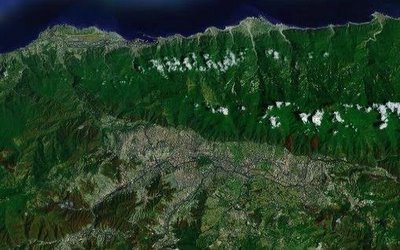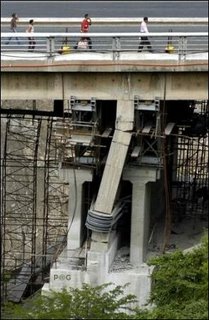Evo Morales has been swept into power, and he is soon to be followed by Chávez-clone
Ollanta Humala who already seems to be benefitting from Mr. Chávez's (i.e. our) generous checkbook. So now seems to be a good time to go over the recipes for the much-ballyhooed Chavista misiones which will allow the new Presidents to appear as demi-gods to the PSFs, more interested in those appearing to help the poor rather than in actually helping them.
Misión Barrio Adentro
1. Import thousands of Cuban paramedics.
2. Disregard your own country's medical human resources.
3. Break your country's laws by allowing these paramedics to practice medicine unsupervised in your country.
4. Set them up to work in neglected poor areas, living with families and using some of these volunteers' living rooms as examination rooms.
5. Continue the neglect of your country's hospital and health-care infrastructure.
6. Denounce anyone who wonders why you don't create appropriate physical infrastructure for this Misión as a CIA agent.
7. Denounce anyone who wonders why you don't open the books of the Misión to see how much it costs the public as a CIA agent.
8. Denounce anyone who wonders if there are
any books for the Misión as a CIA agent.
9. Denounce anyone who criticizes you for not using local doctors and instead relying on Cuban paramedics who may or may not have the necessary training and who operate illegally, as a CIA agent.
10. Denounce anyone who wonders why these Cubans are forcibly sent to Venezuela while their families are held hostage in Cuba, as CIA agents.
Misión Mercal
1. Set up a bunch of small supermarkets in neglected areas selling sub-par, imported food below cost.
2. Sell this food at a subsidized price to anyone who wants it, so the more a person consumes, the more that person will recieve in subsidies.
3. Expand your network to include middle-class areas.
4. Denounce anyone who wonders why a system that rewards those that consume more (i.e. are wealthier) with more subsidy money as a CIA agent.
5. Denounce anyone who wonders why middle-class people need subsidized food when that money could be spent in direct subsidies for poorer people, as a CIA agent.
6. Denounce anyone who wonders why the military staff managing Mercal demands Mercal providers to supply the government with buses to haul voters to the polls, as a CIA agent.
7. Denounce anyone who questions why the government needs to actually RUN supermarkets when trying to subsidize its poorest citizens (a worthy goal if any), as a CIA agent.
8. Denounce anyone who wonders about the sudden wealth of the Mercal generals as a CIA agent.
9. Denounce anyone who wonders if Mercal is a way of putting private supermarkets out of business as a CIA agent.
10. Denounce anyone who wonders why middle-men seem to be buying cheap stuff at Mercal and selling it to supermarkets at high prices as a CIA agent.
11. Denounce anyone who asks to see the books of Misión Mercal as a CIA agent.
Misión Cadivi
1. Subsidize the purchase of dollars.
2. Use these subsidies to keep private industry concentrated on getting subsidies from your government, and away from trying to unseat you.
3. Subsidize the wealthy who wish to travel overseas.
4. Subsidize the wealthy who wish to purchase stuff from the Internet.
5. Subsidize the wealthy who wish to withdraw cash from foreign ATMs.
6. Denounce anyone who wonders if directly subsidizing big businesses, wealthy Venezuelan tourists and foreign airlines is sound social policy, as a CIA agent.
Misión Robinson
1. Teach some people to read and write.
2. Proclaim the Unesco has declared your country illiteracy-free.
3. Deny any progress in literacy ever occurred prior to your arrival.
4. Denounce anyone who wonders why Unesco knows nothing about Venezuela being illiteracy-free, as a CIA agent.
5. Denounce anyone who still does not know how to read and write as a CIA agent.
Misión Identidad
1. Announce a massive plan to hand out ID cards and register people to vote.
2. Set up make-shift ID-card impression operations in sidewalks, bull-fighting rings and under coconut tress.
3. Don't ask for any corroborating data when handing out ID cards.
4. Nationalize and register to vote any foreigner who asks for it, making sure they know how to vote for you.
5. Deny indentity cards and passports to anyone who has dared to challenge you publicly.
6. Continue allowing your civil servants to enrich themselves by taking bribes for issuing passports.
7. Denounce anyone who wonders why Venezuela does not have a modern, reliable and accessible civil registry as a CIA agent.
8. Denounce anyone who wonders why thousands of people born prior to 1900 are registered to vote as a CIA agent.
9. Denounce anyone who wonders why there are voting centers where thousands of voters share the same last name and birthday as ... well, you know what.
Dedicated to all my Peruvian and Bolivian friends.
 Chavez blamed hoarding by the roasters for recent coffee shortages, saying the government is willing to "pay them what the coffee is really worth" and stressing he would approve only "just" price rises.
Chavez blamed hoarding by the roasters for recent coffee shortages, saying the government is willing to "pay them what the coffee is really worth" and stressing he would approve only "just" price rises.


